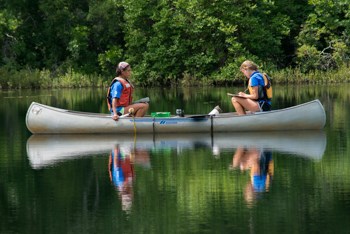
Photo by Naomi Blinick In freshwater kettle ponds, increased nutrient inputs can lead to algal blooms, low oxygen in the water, and changes in thermal layer formation. In brackish and salt waters, nutrient enrichment leads to a cascade of events, including algal blooms, low oxygen conditions, loss of seagrass meadows, and fewer invertebrates and fish. Changes in climate, as well as mercury and other particles deposited from the atmosphere through wind and rain, contribute to declining water quality across the region. Monitoring water quality of aquatic resources aids in developing management strategies for protection and mitigation by identifying the source and level of impacts to a given ecosystem.
|
Last updated: February 26, 2015
